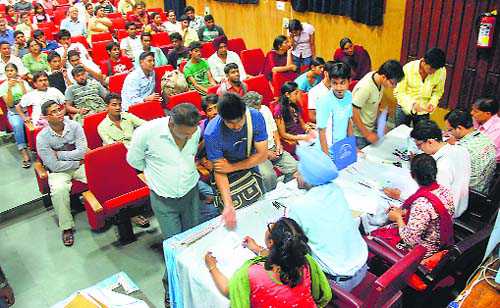Advertisement
HARYANA’S polytechnic colleges were able to fill only one fourth of the seats available for diploma courses in engineering. Not that degree courses have a better fate. Close to 69 per cent seats in Punjab's engineering colleges find no takers. There is no change in the southern states too where the proliferation of technical institutes had set a trend for the rest of the country in the 80s. Technical education in India is suffering from the perils of plenty.
To get to the malaise, committees and their recommendations have piled up data on the demand and supply gap to work out cause and effect analysis. The exercise has resulted in multiplying the number of regulatory bodies, which have failed to check falling standards and mushrooming of technical education institutions. The renewed thrust on the complete autonomy of All India Council for Technical Education (AICTE), the regulatory body on technical education, perhaps, comes in the wake of PM Modi's clarion call of 'make in India.'
Yet one more government-appointed panel has called for "the liberation of Goddess Saraswati from the shackles of government control". In terms of nomenclature, Vishwakarma would have been a better choice though. It's interesting how a controlling body recommends liberation from the very government that forms and funds it. HRD Minister Smriti Irani along with the heads of technical institutions formed the review committee to analyse and restructure the AICTE in November 2014. The report was sought within six months.
Prepared by the four-member panel, it calls for constitutional status for AICTE and demands complete autonomy. It has also recommended amendments to the Constitution to make technical education a fundamental right.
These recommendations have come at a time when the present government's policy of lowering the budget allocation to the entire education sector has rung worrying bells. The committee has asked for raising financial assistance to AICTE from Rs. 200 crore a year to Rs. 20,000 crore!
The U.R. Rao Committee, which too had reviewed the performance of AICTE in 2004, 15 years after it was formed, had drawn attention to the unsustainable expansion of technical education. The free- for- all growth of engineering colleges of the 80s that was allowed to continue, with little check on quality and the prevailing market conditions, has led to the present state. Rao too had made far-reaching recommendations to achieve excellence in this sector.
Of the subjects under AICTE's purview, the most worrying has been engineering institutions because of their phenomenal growth. According to a survey, of the five courses only one taught across engineering colleges has received accreditation. This puts a question mark on the relevance of accreditation offered by AICTE. The director of a reputed government run engineering college in Punjab avers, "The process of accreditation has often made us wonder. While the inspecting teams demand unrealistic specifications from us, how do so many private colleges receive accreditation, flouting all norms?" Something is amiss.
In the present context, the role of the AICTE is to ensure optimal growth of quality technical education, consistent with the country's economic development in the globalised environment. Is the concern around technical education, in the context of 'make in India', as exploratory as was the demand for more institutions of technical education after the economy was liberalised? The speculative growth was exploited by self-financing enterprises, in the name of providing education and training. Technical education has expanded beyond sustainable levels right under the nose of AICTE, from 1,511 engineering colleges in 2006-07 to an astoundingly high 3,345 in 2014-15. A large number of vacant seats have given rise to all sorts of 'adjustments' in these colleges. And quality has further worsened.
Today, 20 to 33 per cent of the 1.5 million engineering graduates passing out every year run the risk of not getting a job at all. Their rapid growth can be attributed to an ecosystem built around feeding the $110 billion outsourcing market and the huge demand for engineers in the IT sector. But the demand for IT related jobs fell sharply due to multiple factors. Whether it is the below-par quality of education provided by private colleges or the stagnating demand for the number of engineers, a large number of engineering pass outs face a bleak future. The fortunate few land jobs which are well below their technical qualifications.
A sad pointer to the grim scenario is only a small percentage of those who 'pass out' from engineering colleges possess skills worth the name. Most of them are not 'employable' or 'trainable', contends former President of National Association of Software and Services Companies (NASSCOM) Kiran Karnik.
Higher education in India is regulated by 17 different bodies, which creates a din of guidelines - at times conflicting. Chief Minister of Haryana demanded formation of SAAC (State Assessment and Accreditation Council), on the lines of NAAC, to check the quality of higher education in the state last week. Creation of more regulatory bodies should be banned at some point.
The moot point is: as against the exponential growth in technical education, it is the finished product of unmatched quality and competitive price which is imported from China and Korea that has to be checked to promote brand 'make in India.' For this we require better technocrats and quality institutions. Greater autonomy is desirous for AICTE, if it can deliver on this front. Autonomy is also desirous for IITs and IIMs, the HRD Minister should know.
vandanashukla@tribunemail.com
Advertisement
×
Unlock Exclusive Insights with The Tribune Premium
Take your experience further with Premium access.
Thought-provoking Opinions, Expert Analysis, In-depth Insights and other Member Only Benefits
Combo
Yearly
Monthly
Already a Member? Sign In Now
Advertisement
Advertisement
Advertisement











